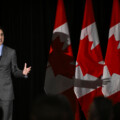“All other nations that tried to kill us have perished. Yet we have survived. Look at you.”
As the grandson of Holocaust survivors, these words from Marie Doduck to Jewish middle-school students hit me right in the kishkes.
Learning about the Holocaust has always been important to me. My grandmother towards the end of her life chose me to share details that she didn’t tell anyone else—even her own children—and help her document her story so that it can be passed down to future generations. Now as a parent, I am only beginning to struggle with what I tell my kids about our family history. So when I had the opportunity to attend a Yom HaShoah Assembly, I knew I had to be there to both observe and show my daughter how much it means to me.
Born in 1935, Marie Doduck was just five years old when the Nazis conquered her hometown of Brussels. She was forced into hiding until the end of the war. Her survival, in her own words, was thanks to a mixture of good luck and the goodwill of many non-Jews who took her in. In 1947, she came to Canada as part of the Jewish Canadian Congress’ Orphan War Project which helped foster children who had lost their parents in the Holocaust.

For more than an hour at the assembly, the students had an opportunity to hear Marie’s story. She was particularly keen to spend most of the time answering questions. I was amazed by how much more the students knew about the history of the Second World War and the Holocaust than I thought they would. They wanted to know everything from details about her daily life routine to her views on the Nazis.
But it was one student’s question that folded the past into the present: what do you think about the massacre of Israelis on October 7th and the current rise of antisemitism in Canada?
Marie didn’t hesitate in her response. She said she thinks she’s reliving what happened to her some 80 years ago. She recalled that the violence began with words, so we must call out hate speech before it goes too far. But she did say there was one crucial difference between then and now.
Today the Jewish people have a country to call our own. She told the students that if Israel existed before the Holocaust, that’s where European Jews would have gone for sanctuary. We now have a place to go if we must leave Canada—a thought that none of us would’ve even imagined a few months ago. But she also said we won’t leave or turn the other cheek like we did when she was a girl in Belgium. We will fight back both here in Canada and in Israel.
She reminded the students that Israel has one of the most powerful militaries in the world. Her message paralleled something I heard Israel’s Ambassador to Canada Iddo Moed share on Hub Dialogues: we will win this war because we have to win the war.
I walked out of the assembly thinking how precious it was that my daughter had the opportunity to hear directly from a survivor. While I’m grateful they were able to meet, my daughter was not even five when my grandmother passed away. Thankfully we have a self-published photo album recounting her family history and a translation of her diary—written in a mixture of Yiddish, Russian, and Polish with a few of her own drawings throughout the pages—that offers a first-person account of her survival. Yet none of this can compete with hearing directly from a survivor who can also situate the past into the present.
At a time when protesters distort the Holocaust, chant the genocidal “River to the Sea” slogan, and call on Jews to “go back to Europe,” Marie’s story empowers the great-grandchildren of Holocaust survivors. It offers meaning for why we continue our traditions despite the trauma, costs (yes, Jewish education is not cheap), and threats we face, as they are reminded every day when they see police parked outside their school.
I know there will be a time soon when we won’t have any more living survivors. Until that day comes, it is incumbent on all of us to hear their stories and ensure that young Canadians from all faiths and backgrounds share in this opportunity.
Recommended for You

Falice Chin: The ‘wild and weird’ Calgary Stampede

Michael Bonner: Are we witnessing the last gasp of Iran’s Islamic Republic?

Peter Menzies: Justin Trudeau’s legislative legacy is still haunting the Liberals

Howard Anglin: Lament for a Lament



